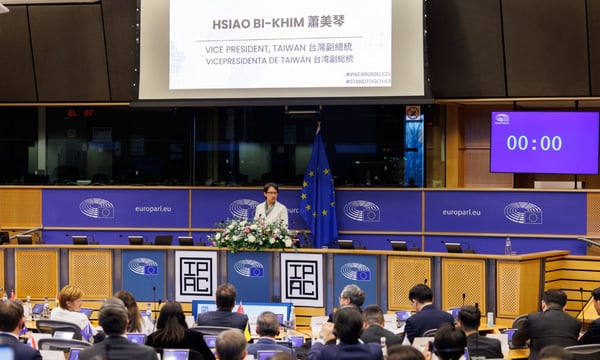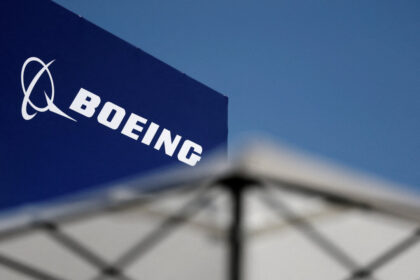Europe is seeing a flurry of Taiwanese diplomatic activity, with a visit to Brussels by Vice President Hsiao Bi-khim, as well as visits to Berlin by former President Tsai Ing-wen and Democratic Progressive Party (DPP) legislator Puma Shen. These visits all took place as part of different events.
Hsiao’s visit was for the annual summit of the Inter-Parliamentary Alliance on China (IPAC). IPAC is a cross-parliamentary alliance of parliamentarians that focuses on relations with China, usually in a manner critical of Beijing’s record on human rights. IPAC events have often taken a large pride of place in Taiwan, since it is one of the rare spaces in which Taiwan can interact with international parliamentarians in an open manner. According to IPAC, her trip took place with the assistance of the European Union and the Belgian government.
Domestically, Hsiao’s speech was touted as a diplomatic breakthrough, in that this is the first time that a Taiwanese vice president has spoken at the European Parliament in Brussels. Hsiao’s address hit on familiar themes, raising the shared threat to democracies from authoritarian actors, and describing some of the challenges that Taiwan faces at present, including gray-zone tactics, disinformation, and suspected sabotage of submarine cables.
Hsiao went on to tout the role that Taiwan plays in the world’s AI ecosystem and its dominance in the field of semiconductors. She called on international partners to strengthen ties with Taiwan, not only to maintain global peace, but because Taiwan can contribute in fields ranging from humanitarianism to tech cooperation.
Hsiao reportedly was not informed that she would be traveling to Brussels until shortly before she left for Europe. According to reports, Hsiao had been previously told that she would be speaking to the European Parliament via video recording.
The classified nature of Hsiao’s trip was probably due to a previous incident in which Czech intelligence uncovered a plot by a Chinese military attaché to crash a vehicle into Hsiao’s motorcade during a trip by her to Prague in March 2024. At the time, Hsiao was the vice president-elect.
Since Hsiao’s visit, two men have been arrested for attempting to spread disinformation that Taiwan paid for IPAC to host Hsiao and rented the venue. The claim is that Taiwan paid 8 billion euros for Hsiao’s appearance, with this information attributed to the French BBC. This narrative has increasingly been visible domestically in Taiwan, particularly after news reports that Liz Truss and Mike Pompeo were paid to speak at high-profile events in Taiwan.
Taiwan’s representative to the European Union, Shieh Jhy-wey, has denied the claims regarding Hsiao’s trip. One of the arrested men, who was taken into custody after returning from a trip to Japan, claimed to have been joking in creating a meme about Hsiao’s travels.
Separately, former President Tsai Ing-wen was a keynote speaker at the Berlin Freedom Conference. During her remarks, Tsai urged unity against authoritarianism and compared threats to Taiwan from China to the threats that Europe faces from Russia. Sounding a similar note to Hsiao, Tsai emphasized Taiwan’s resilience in the face of such threats, as well as its Whole-of-Society approach to countering these dangers. Tsai was accomplished by former Digital Minister Audrey Tang, whose comments primarily focused on the emergent field of AI.
This is not the first time that Tsai has served as a de facto diplomat for the Lai administration. Tsai also traveled to Europe in October 2024, visiting Czechia, France, and Belgium. Although reports at the time suggested that Tsai might visit the United States and Canada as well, this does not seem to have taken place – possibly over concerns that the visit would be politicized in the course of the 2024 U.S. presidential election in November.
Tsai again traveled to Europe in May 2025, visiting Denmark, Lithuania, and the United Kingdom. The inclusion of the United Kingdom is notable, in that the Guardian reported in October 2024 that a planned trip by Tsai to the United Kingdom had been canceled over concerns that this would overshadow a visit by the U.K. foreign secretary to China. This cancellation would have been a special disappointment to Tsai, who did her PhD at the London School of Economics and speaks English with a British accent.
Finally, DPP legislator Puma Shen made a separate visit to Berlin to speak at a Bundestag parliamentary hearing regarding disinformation. Before becoming a legislator, Shen was known as a disinformation expert and the founder of the Doublethink Lab research organization, as well as the Kuma Academy civil defense training organization.
Shortly before his visit to Germany, the Chinese government had announced that it was conducting an investigation into Shen in Chongqing. Chinese state-run media suggested that China would seek to use Interpol to arrest him. During his comments at the German Bundestag, Shen stated that he was not afraid of Chinese efforts to threaten him.
Shen has been a special target of ire by the Chinese government, probably because of his reputation for being tough on China. As such, he has been sanctioned by China on a number of occasions. Shen has also related incidents in which individuals sought to impersonate him at international events he was attending. He has reported surveillance and even threats to himself and his family.
The Chinese government’s claims about investigating Shen or claiming that he would be apprehended by Interpol are aimed at establishing the perception that China has international authority in a way that Taiwan does not. It also seeks to send the chilling signal that DPP politicians could face arrest if they travel abroad.
On Shen specifically, China has sometimes sought to frame him as a hypocritical war profiteer. Earlier this year, China sanctioned Shen’s father, Shen Tu-ching, for running a company that conducts business in China. Commentators in China pointed to the fact that Shen’s father’s company operates in the Chinese market while his son is the founder of a civil defense organization, claiming Shen aims to financially profit off of anxieties about cross-strait tensions.
KMT politicians such as legislative caucus leader Fu Kun-chi have also accused Shen, originally a U.S.-educated academic, of being an American spy in public comments.
In response to the threats against Shen, the DPP called on KMT Legislative Yuan president Han Kuo-yu to condemn China’s actions. Instead, Han urged the DPP to ensure Shen’s safety – by improving ties with China. Han blamed the DPP for deteriorating cross-strait relations and implied that the threat against Shen was the inevitable result of the DPP’s own actions.
Although some have interpreted Taiwan’s charm offensive in Europe as due to anxieties about Taiwan’s relationship with the United States, it is more likely the case that Hsiao, Tsai, and Shen coincidentally happened to be in Europe, given they were all attending separate events. Attempts to expand Taiwan’s international space and links with Europe have been ongoing, even if there has been increased concern about the Trump administration’s mercuriality on the issue of Taiwan.






